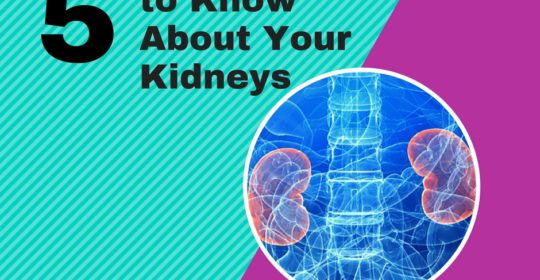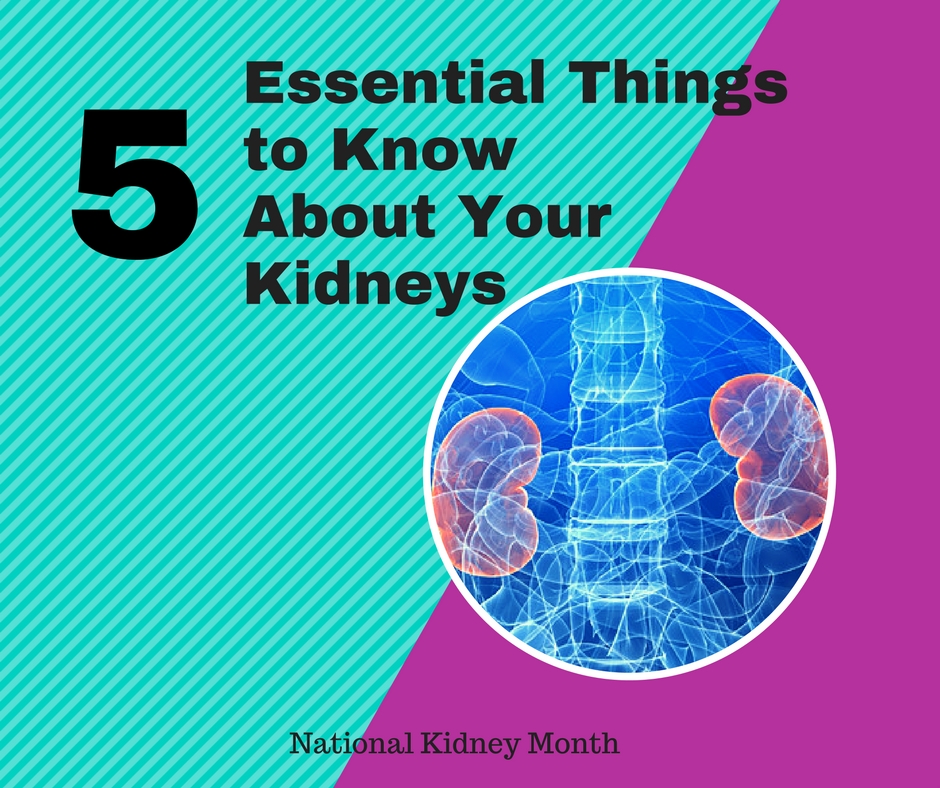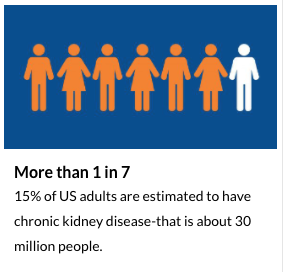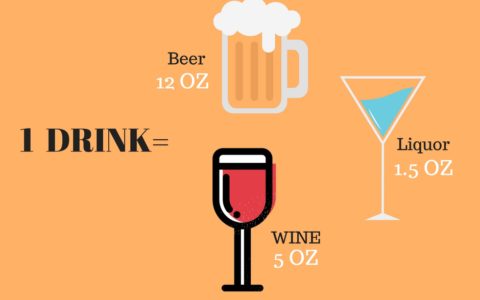
5 Essential Things to Know About Your Kidney

1. What is Kidney?
The kidneys are two bean-shaped organs. They are fist-sized organs on either side of your backbone above your waist.
2. How does it work?
Filter all the blood in your body every 30 minutes. Your kidneys filter extra water and wastes out of your blood and make urine. They work hard to remove wastes, toxins, and excess fluid. They also help control blood pressure, stimulate the production of red blood cells, keep your bones healthy, and regulate blood chemicals that are essential to life. Kidneys that function properly are critical for maintaining good health.
3. What is Kidney disease?
Kidney disease occurs when the kidneys become damaged and lose their ability to filter the blood. Kidney disease can happen quickly as the result of severe illness, injury or poisoning, but most often develops slowly and silently until the kidneys have nearly failed. The two most common causes of kidney disease are diabetes and high blood pressure. Left untreated, kidney disease can lead to kidney failure.

According to Centers for Disease and Prevention Control (CDC) more than one in seven American adults are estimated to have chronic kidney disease (CKD). CKD is a condition in which the kidneys are damaged and cannot filter blood as well as they should. Because of this damage, excess fluid and wastes from blood remain in the body and may cause other health problems, such as heart disease and stroke.
Some other health consequences of CKD include:
- Anemia or low number of red blood cells
- Increased occurrence of infections
- Low calcium levels, high potassium levels, and high phosphorus levels in the blood
- Loss of appetite or eating less
- Depression or lower quality of life
CKD has varying levels of seriousness. It usually gets worse over time though treatment has been shown to slow progression. If left untreated, CKD can progress to kidney failure and early cardiovascular disease. When the kidneys stop working, dialysis or a kidney transplant are needed for survival. Kidney failure treated with dialysis or kidney transplants are called end-stage renal disease (ESRD).
Not all patients with kidney disease progress to kidney failure. To help prevent CKD and lower the risk of kidney failure, control risk factors for CKD, get tested yearly, make lifestyle changes, take medicine as needed, and see your health care team regularly.
4. Who’s at Risk?
You are at greater risk for kidney disease if you have diabetes or high blood pressure. If you experience kidney failure, treatments include kidney transplants or dialysis. Other kidney problems include acute kidney injury, kidney cysts, kidney stones, and kidney infections.
It’s also important to note that African Americans, Hispanic/Latino Americans, and American Indians are at a higher risk for CKD.
Approximately 15% of US adults are estimated to have CKD, but because early CKD has no signs or symptoms, most don’t know they have it. If you have any of these risk factors for CKD, talk to your doctor about getting tested.
5. What can I do to keep my kidneys healthy?
You can protect your kidneys by preventing or managing health conditions that cause kidney damage, such as diabetes and high blood pressure. The steps described below may help keep your whole body healthy, including your kidneys.
Make healthy food choices
Diabetes and high blood pressure are the two leading causes of kidney disease. Eating healthy is one way to maintain good health. Small changes to your diet can help you manage your diabetes and high blood pressure and possibly protect your kidneys. Choose foods that are healthy for your heart and your entire body: fresh fruits, fresh or frozen vegetables, whole grains, and low-fat or fat-free dairy products. Eat healthy meals and cut back on salt and added sugars. Aim for less than 2,300 milligrams of sodium each day. Try to have less than 10 percent of your daily calories come from added sugars.
If you have CKD, meet with a dietician to create a kidney-healthy eating plan. The plan may need to change as you get older or if your health status changes.
Make physical activity part of your routine

Be active for 30 minutes or more on most days. If you are not active now, ask your healthcare provider about the types and amounts of physical activity that are right for you. Regular physical activity will help to control blood pressure and blood sugar levels.
Aim for a healthy weight
Improve your kidney health by making a commitment to reach or maintain a healthy weight. Extra weight increases the risk of developing diabetes and high blood pressure, the two most common causes of chronic kidney disease (CKD). People affected by obesity have an 83 percent higher risk of developing CKD compared to those who have a healthy weight.
According to National Institute of Health (NIH), more than 20 million people — approximately 1 in 10 American adults — have kidney disease. More than 1 in 3 U.S. adults and about 1 in 5 teens are affected by obesity. It is always best to work with a healthcare provider to create a realistic weight-control plan. You also can use other resources such as the NIH Body Weight Planner to help achieve and stay at a healthy weight
Get enough sleep
According to Central of Disease Control and Prevention (CDC), adults need 7 or more hours of sleep per night for the best health and wellbeing. Short sleep duration is defined as less than 7 hours of sleep per 24-hour period. Insufficient sleep has been linked to the development and management of a number of chronic diseases and conditions, including diabetes, cardiovascular disease, obesity, and depression.
According to a recent study by Ciaran McMullan, MD, of Brigham and Women’s Hospital, “Kidney function is actually regulated by the sleep-wake cycle. It helps coordinate the kidneys’ workload over 24 hours. We also know that nocturnal patterns can affect chronic kidney disease and that people who sleep less usually have faster kidney function decline. What we’re doing now is looking at the specific hormones that may be behind these declines.”
Aim for 7 to 8 hours each night, Improving sleep quality may be helped by better sleep habits. Some habits that can improve your sleep health:
- Be consistent. Go to bed at the same time each night and get up at the same time each morning, including on the weekends.
- Make sure your bedroom is quiet, dark, relaxing, and at a comfortable temperature.
Remove electronic devices such as TVs, computers, and smartphones from the bedroom. - Avoid large meals, caffeine, and alcohol before bedtime.
- Get some exercise. Being physically active during the day can help you fall asleep more easily at night.
Stop smoking
Smoking is the leading cause of preventable deaths in the world. According to Center for Disease and Prevention (CDC), tobacco use causes more than 5 million deaths per year worldwide. Smoking harms almost every organ of the body. Globally, smoking related-diseases kills 1 in 10 adults. Smoking-related diseases include cancer, heart disease, and lung diseases such as emphysema, bronchitis, and chronic airway obstruction. It’s never too late to quit smoking. Quitting smoking now improves your health and reduces your risk of heart disease, cancer, lung disease, and other smoking-related illnesses.
According to National Kidney Foundation, smoking can affect medicines used to treat high blood pressure. Uncontrolled or poorly controlled high blood pressure is a leading cause of kidney disease. Smoking slows the blood flow to important organs like the kidneys and can make kidney disease worse.
Ask for help so you don’t have to do it alone. You can start by calling the national quitline at 1-800-QUITNOW or 1-800-784-8669. For tips on quitting, go to Smokefree.gov .
Limit alcohol intake
According to research done by Murray Epstein, M.D. from the University of Miami School of Medicine, Miami, Florida, USA, both acute and chronic alcohol consumption can compromise kidney function, particularly in conjunction with an established liver disease. Investigators have observed alcohol-related changes in the structure and function of the kidneys and impairment in their ability to regulate the volume and composition of fluid and electrolytes in the body. Alcoholic patients may experience low blood concentrations of key electrolytes as well as potentially severe alterations in the body’s acid-base balance. In addition, alcohol can disrupt the hormonal control mechanisms that govern kidney function. By promoting liver disease, chronic drinking has further detrimental effects on the kidneys, including impaired sodium and fluid handling, and even acute kidney failure.

Drinking too much alcohol also can increase your blood pressure and add extra calories, which can lead to weight gain. If you drink alcohol, limit yourself to one drink per day if you are a woman and two drinks per day if you are a man. One drink is:
- 12 ounces of beer
- 5 ounces of wine
- 1.5 ounces of liquor
Explore stress-reducing activities
Learning how to manage stress, relax, and cope with problems can improve emotional and physical health. Physical activity can help reduce stress, as can mind and body practices such as meditation, yoga, or tai chi.
Manage diabetes, high blood pressure, and heart disease
If you have diabetes, high blood pressure, or heart disease, the best way to protect your kidneys from damage is to:
- Keep blood glucose and blood pressure numbers close to your goal. The blood pressure goal for most people with diabetes is below 140/90 mm Hg. Checking your blood glucose, or blood sugar level is an important way to manage your diabetes. It is recommended to test your blood glucose one or more times a day.
- Take all your medicines as prescribed. Talk with your healthcare provider about certain blood pressure medicines called ACE inhibitors and ARBs, which may protect your kidneys. The names of these medicines end in –pril or –sartan.
- Be careful about the daily use of over-the-counter pain medications. Regular use of nonsteroidal anti-inflammatory drugs (NSAIDs) such as ibuprofen and naproxen, can damage your kidneys. Learn more about over-the-counter medicines and your kidneys.
- To help prevent heart attacks and stroke, keep your cholesterol levels in the target range. There are two kinds of cholesterol in your blood: LDL and HDL. LDL or “bad” cholesterol can build up and clog your blood vessels, which can cause a heart attack or stroke. HDL or “good” cholesterol helps remove the “bad” cholesterol from your blood vessels. A cholesterol test also may measure another type of blood fat called triglycerides.
- Take medications as instructed and ask your doctor about blood pressure medicines called angiotensin-converting enzyme inhibitors and angiotensin II receptor blockers, which may protect your kidneys in addition to lowering blood pressure.
- Include a kidney doctor (nephrologist) on your health care team.
During your next medical visit, you may want to ask your healthcare provider about your kidney health. Early kidney disease may not have any symptoms, so getting tested may be the only way to know your kidneys are healthy. Your health care provider will help decide how often you should be tested.
See a provider right away if you develop a urinary tract infection (UTI), which can cause kidney damage if left untreated.
Read more :
Weight Management
Source:
- CDC
- NIDDK
Credit Image:
- CDC


Most Commented